QuestionHi, and first off thank you for taking time out of your day to read my question and try to help me and my betta (Ethan) out...We both appreciate it. OK, so I have a 5 gallon tank and in it I have 1 male betta, 3 tetras, and an Octo... (he's the algae eater). My Betta for the last couple of days has been behaving weird. He hides under this cave-like bridge he usually loves to sleep in. Only now he's been spending all night AND all day in there coming out barely 20 min a day. He was always a very active fish and it's sad to see him so miserable. One of his gills, his left one.. is swollen and appears to have these horizontal lines across it, it's discolored and does not look healthy at all. The other gill appears normal. His breathing is however very rapid on both gills. He seems to open his mouth every now and then as if gasping. He doesn't go to the surface much any more... just stays on the bottom under his cave or hiding under a plant when he does come out. The water is kept warm, because i've heard that they prefer warmer water when they are sick. The temp. is about 82 degrees. I've been treating the tank with Jungle's Life Guard medicine for 3 days, since i noticed the symptoms. He doesn't seem to be responding to the medication. The gill still is inflamed, and if anything maybe a tinnnnnny bit less than yesterday but if theres a difference at all it's hard to tell. There is also Coppersafe in the tank. I always have it in there as a preventative. He seems really miserable and i want him to get better. I've had him for almost 2 years. And, though I know that's about the length of their life span, I've grown attached and I'm not ready to let him go yet. Please if you can suggest a different medication, or anything I can do to make him more comfortable, happy and able to breathe easier i'd greatly appreciate it and i'm sure my betta Ethan would too. His ammonia level is...barely .5, though I know idealy it should be 0. His Nitrite is 0. And, his Ph is....6.4, I know that's low, so i added a ph buffer which puts it at a neutral 7.0.
He also has an air stone in his tank to increase oxygen, this has always been in his tank, and also this carbon filter is currently not in the tank because of the medication I'm using.(it said on the package to remove the carbon filter, add a half a tablet a day consecutive for 5 days at 24 hr intervals and then on the 6 th day to do a 25 % water change and add a baterial enzyme product and a dechlorinator all for the entire tank volume. My other fish seem to be in perfect health. I don't know if i've given you all the information you need, or if i've given you too much but, I didn't know what you'd need to know exactly... so here it is.. I hope you can help soon. Thank you!
AnswerHi Erika
Thank you for providing all the info :)
Ok...so you've had him about 2 years, and usually they're already about a year old when they're at the pet store, so he is pushing his "life span" technically speaking, though some have been known to live up to 5 years. I'm trying to figure out which issue to address first here, so I'm kind of jumping around on you, sorry....
The ph is fine at 6.4. Don't use the ph up/neutral product anymore. Just about all freshwater fish we buy at the store are tank bred or farm raised as opposed to being wild caught. So, they can tolerate ph ranges of 6.0-8.0 just fine. When ph fluctuates around, which usually happens when you use those products, it causes more stress on the fish. So, just let it be what it naturally is from your tap, it sounds fine. The ammonia shouldn't be present in the tank, however, with the ph staying under 7.0, it is naturally converted to it's nontoxic form-ammonium, so it shouldn't be harming the fish. But, that's not an excuse to let the ammonia get out of whack. Depending on the type of tetras, it's a tad overstocked. I would say the betta and maybe the oto cat would be all I would recommend to add to your tank size. Though, oto's should have a little larger like a 10 gallon. But, that may be why the ammonia is present, or it could be from the meds-which is most likely the case, since some meds will kill off the beneficial bacteria in a tank. Monitor your ammonia and nitrite levels for awhile to keep an eye on them.
The air stone is good for the other fish in the tank, especially since it's at a higher temperature. Carbon isn't necessary in tanks, so you can stop using that as well. It's really only needed to remove medicines from the tank.
I was trying to look around yesterday for a site, I could've swore I read something about Coppersafe and gill damage....but it very well could've something else. I don't recommend using meds as a preventative. A lot of those meds are actually pretty harsh, and using them like that can cause damage to the fish, and it can also lead to resistant strains of parasites/bacteria. So I would stop using the Coppersafe all the time. If you dont' overstock the tank, do regular weekly water changes, feed a varied diet, quarantine all new fish, you can pretty much keep a disease free tank. I also don't recommend using salt on a regular basis either, just strictly for treatments. Now, tetras and oto cats are sensitive to a lot of meds as well as salt, so you need to be careful what you use. I was reading that LifeGuard label a few weeks ago, and it's one of the stronger meds, but if the other fish are tolerating it then just continue with that treatment.
It's hard to say exactly what's going on with the betta. It could be parasites like gill flukes-which is my initial thought since he's hiding and gasping as well which are common symptoms of gill flukes along with rapid breathing, a bacterial infection, or just gill damage from water quality or possibly from using the meds continually, and it just affected him for some reason, maybe being older. The only way to tell for sure is to do a scraping and look under a microscope, and then you need to know what to look for. If it is parasites though, those are hard to treat in the gills, because they cause the fish to produce excess mucous, and the meds can't penetrate through to kill the parasites. Are you seeing any of that? The fish's body color might appear dull as well or have a greyish look to it. I would go ahead and run the course of the parasite meds, then I would check into using an antibiotic as well in case it's bacterial. I would try Maracyn Two. If that fails, then I would just chalk it up to gill damage from something or other, and there's not much you can do. Again, monitor the water quality as well after using all these meds. It's usually recommended to move a sick fish to a separate tank to treat, plus that helps save your beneficial bacteria from getting killed off in the tank. But, since you've already started the treatment, it might be best to just leave him there to avoid stressing him any further by moving him. But, may be something to think about when you do the antibiotic treatment-it's up to you. Since it's a betta, it's a bit easier since you really don't need a filter set up for him, and any 1 gallon+ sized container will work. Just do frequent partial water changes every other day or so on that. If you do put him in a separate tank, I would go ahead and also add 1 tablespoon per 5 US gallons of aquarium salt as well.
Sorry can't be of much more help then that. Like I said, it's hard diagnosing fish ailments. Something else you might want to think about, is picking up some clove oil in case you need to euthanize him. Good thing to keep on hand at home for situations like this. If you're in the US, it can be difficult to find, but I found some at Rite Aid/Eckerds it's in the pharmacy have to ask for it, it's over the counter though. Very small bottle is a few dollars. You get a separate container for the fish-don't use the tank or bowl, add some tank water and a few drops of the clove oil. Not sure on exact amount, I usually add a lot, but mix it really good because it is an oil. Then add the fish. In small doses clove oil is an anesthetic for fish to do surgeries, but larger doses it kills them humanely. They kind of gasp a bit, but then their breathing slows down and they go peacefully. I let them sit in that for a good 1/2 hour and make sure they don't breathe at all. Then I dump the fish and water into a ziplock bag and put it in the freezer, just to be sure, until I can bury them by a tree or shrub in the yard. Here's a few links on euthanasia for fish:
http://www.petalia.com.au/templates/StoryTemplate_Process.cfm?Story_No=1885
http://www.wisegeek.com/what-is-the-most-humane-way-to-euthanize-a-fish.htm
I know you don't want to think about that now, but believe me, it's better to be prepared ahead of time. It's an icky feeling trying to find the clove oil(and like I said it's a bit hard to find)and you can't, and you have a really sick fish that is just miserable.
Hope he does better and good luck! Let me know if you have more questions.
Christy

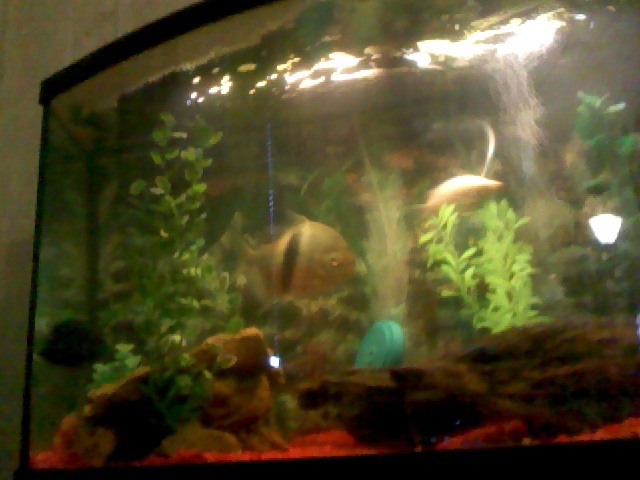 46 gallon tank
Questionmy tank
QUESTION: hello in my tank I use
46 gallon tank
Questionmy tank
QUESTION: hello in my tank I use
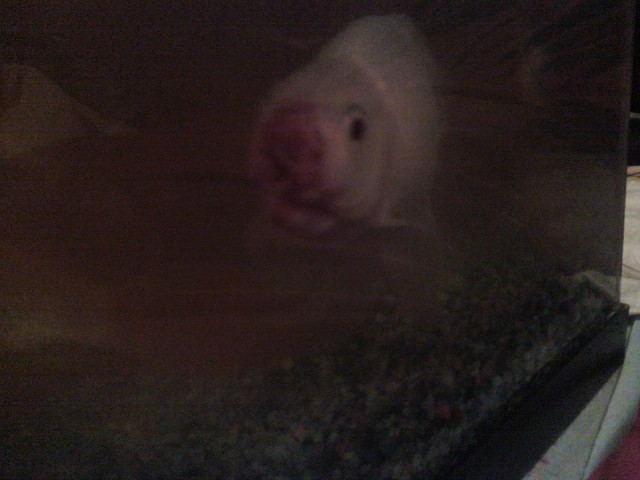 Broken lips
QuestionQUESTION: Hello expert, i hope you can help me.
Broken lips
QuestionQUESTION: Hello expert, i hope you can help me.
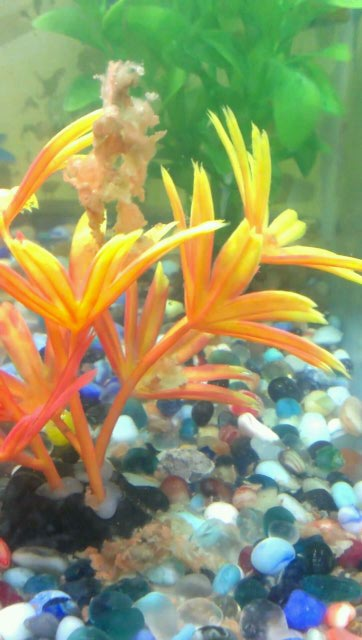 spotted molly fish pet
Question
stuff? ?? more stuff
Is it normal
spotted molly fish pet
Question
stuff? ?? more stuff
Is it normal
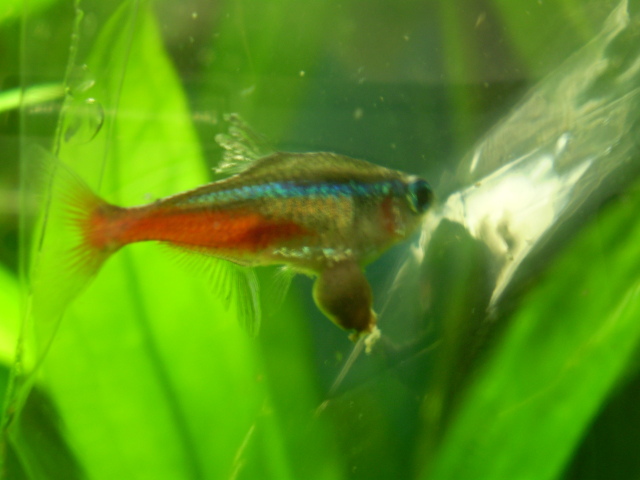 Neon Tetra belly discharge
QuestionNeon Tetra Belly Disch
QUESTION: An othe
Neon Tetra belly discharge
QuestionNeon Tetra Belly Disch
QUESTION: An othe
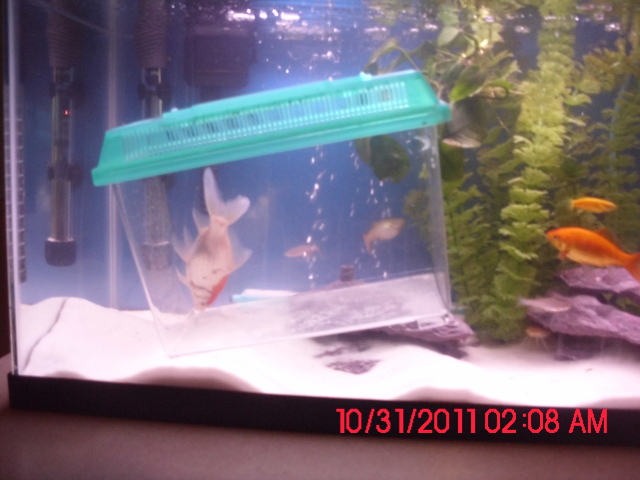 Facedown Gold fish
Question
face down gold fish
On firday i took my
Facedown Gold fish
Question
face down gold fish
On firday i took my